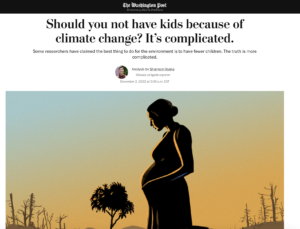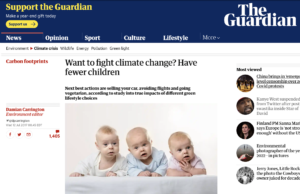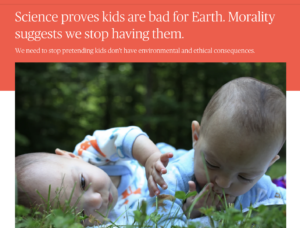WaPo: Last month, the world’s population reached 8 billion. According to one demographic estimate, 7 percent of all the people who have ever lived – starting from the origins of humanity about 200,000 years ago – are still alive today. …
But the scientific data around the carbon impact of having children is relatively slim. …
Moreover, the study’s central estimate of the “carbon legacy” of having a child also assumes that the world makes absolutely no progress on shifting the economy away from fossil fuels from 2009 to 2400. …Even if the United States doesn’t pass any new climate policy between now and 2100, a child born today will have an average carbon footprint of about half of their grandparents’: that’s because renewable energy has gotten cheaper, and natural gas has largely replaced coal….
December 2, 2022 at 6:00 a.m. EST
When Meera Sanghani-Jorgensen was in her 30s, she and her husband began to discuss having children. They both wanted to have kids, but Sanghani-Jorgensen couldn’t shake the feeling that, by giving birth, she might be doing something bad for the earth.
“I wanted to have a child, but I was also looking at the planet and thinking: ‘Well, what kind of future will we have if there’s more of the same?’ ” she said. She thought about the diapers, the party favors, the toys, and the billions of tons of carbon emissions warming the planet every year. She felt weighed down by the consumption of her children before they were even born.
After much research, Sanghani-Jorgensen and her husband decided that having a child — a single child — could fulfill their desires without putting undue burden on an overheating world. “I was very particular about only having one,” she said.
Her husband died in 2012; in the years since her daughter was born, Sanghani-Jorgensen, 48, considered having a second child many times, but always held back. “My reservation has been exactly environmental concerns,” she said. Her daughter is now 13 years old.
Sanghani-Jorgensen is not alone. She joins a generation of people living in the U.S. and other rich countries preoccupied with how having children may worsen the world’s rapid warming.
The movement isn’t huge, but it has gained widespread attention. According to a 2021 Pew Research Center survey of childless adults, 5 percent of those who cited a specific reason for not having children said it was because of “climate change/the environment.” Thoughtful essays have been written on the topic; activist groups and support networks have been formed and then dissolved. In a letter to investors last year, Morgan Stanley analysts noted that the “movement to not have children owing to fears over climate change is growing and impacting fertility rates quicker than any preceding trend in the field of fertility decline.”
Yet research on the question has a surprising history, and some of the findings may already be out of date.
The same year that Sanghani-Jorgensen’s daughter was born, two scientists at Oregon State University published a paper estimating that each child born in the United States adds thousands of tons of carbon dioxide to their parents’ lifetime “carbon legacy.” Those findings were later repackaged in a 2017 literature review by two sustainability scientists, who calculated that opting out of having a child would reduce emissions by approximately 60 metric tons per year, an amount that positively dwarfed the other possible actions (living car free: 2.4 tons of emissions avoided; skipping one transatlantic flight: 1.6 tons). Their paper fueled intense media attention — to date, it has been downloaded more than 850,000 times.
“Want to save the planet? Have fewer children,” read one headline in the Guardian. “Science proves kids are bad for the Earth,” declared another in NBC News.
In recent years, however, some climate experts have questioned the science underpinning such calculations. Others reject the idea that parents should feel responsible for the greenhouse gas emissions of their children.
There are, no doubt, environmental consequences to having children. But the question of whether to have kids in a warming world has started to shift from fears over what children will do to the climate to fears over what the climate will do to them.
…
Last month, the world’s population reached 8 billion. According to one demographic estimate, 7 percent of all the people who have ever lived – starting from the origins of humanity about 200,000 years ago – are still alive today.
…
But the scientific data around the carbon impact of having children is relatively slim. To date, the 2009 paper by two Oregon State University scientists is the only original piece of academic research on the question. And that paper took an unusual approach. In an attempt to quantify all potential future carbon emissions of a child, the researchers assumed that a mother and father were each responsible for one-half of the emissions of their future child, one-quarter of their grandchild’s emissions, one-eighth of their great-grandchild’s emissions, and so on until the year 2400 — or until the family line died out.
That assumption resulted in extremely high estimates for the carbon impact of having a child. According to the study, having a child in a developed country like Russia, the United States or Japan, would result in approximately 60 metric tons per year in CO2 emissions — an amount roughly equivalent to putting 13 gas-powered cars on the road for a year. When those numbers were compared to other individual climate actions, in the 2017 study, they looked even more stark.
That idea — that having one fewer child is the most important carbon-cutting move to make — has moved into society. Schneider-Mayerson says that many of the climate-concerned individuals he surveyed were familiar with the 2009 study, or at least its central finding; some even cited it as the moment when they definitively chose to not have children.
But several experts have argued for a different approach to assessing the contribution of having a child to climate change.
First, as Schneider-Mayerson points out, the 2009 study makes the current generation responsible for emissions hundreds of years into the future; by that logic, children born today are responsible for none of their carbon emissions – nor are their children or grandchildren. “It’s the problem of double-counting,” he said. “This suggests that a person is not responsible for their emissions if their parent chose to have them — which doesn’t seem appropriate.”
Moreover, the study’s central estimate of the “carbon legacy” of having a child also assumes that the world makes absolutely no progress on shifting the economy away from fossil fuels from 2009 to 2400. “It’s very egregious in that respect,” said Zeke Hausfather, the climate research lead at the payments company Stripe, who has contributed to past reports by the U.N. Intergovernmental Panel on Climate Change. “It not only assumes that we don’t decarbonize during the life of the child, but also that we don’t decarbonize during the life of their children, or their children’s children.” (The authors of the 2009 study declined to be interviewed on the record for this story.)
And carbon footprints of people living in wealthy countries have already begun to change. According to analysis from the energy and economics firm Rhodium Group conducted for The Washington Post, an American born in 1950 will, over the course of their lives, be responsible for, on average, 19 metric tons of CO2 per year. That person will have spent most of their life using energy provided by coal and other fossil fuels and driving heavily gas-guzzling cars. On the other hand, even if the United States doesn’t pass any new climate policy between now and 2100, a child born today will have an average carbon footprint of about half of their grandparents’: that’s because renewable energy has gotten cheaper, and natural gas has largely replaced coal.
…
If the United States reaches its climate goals – that is, cutting emissions in half by 2030 and to zero by 2050 – the picture looks even more different. In that case, a child born today would have a carbon footprint averaged over their lives of around 2.8 tons per year, not far from a current resident of Brazil. Under that scenario, having one fewer child starts to look on a par with living car-free or skipping a transatlantic flight — significant, but not even the most important individual action one can take.
(That estimate doesn’t include emissions from outside the United States, such as the carbon dioxide released to produce goods that Americans import. But if current imports and exports were taken into account, U.S. emissions would only be about 6 percent higher.)
The central issue, Hausfather said in an email, is that humans don’t cause carbon emissions — fossil fuels cause carbon emissions. A planet with only 4 billion people but an energy system still tied to oil, natural gas and coal, would still emit more carbon than the planet could handle (that is, any amount in excess of what can be absorbed by oceans and land).
And climate change needs to be addressed within the next few decades. According to one study in the Proceedings of the National Academy of Sciences, even a draconian worldwide one-child policy, instituted today, would still result in about 7 billion people in the year 2100. Less than the current United Nations estimate of 11 billion, perhaps, but still enough to burn a great deal of fossil fuels.
On the flip side, if countries decarbonize by switching to clean energy, “it doesn’t matter how many people are on the planet,” Hausfather said. “It comes down to: ‘How hopeful are you that society can solve this problem?’”
…
Such concerns have no easy answer. Many people, perhaps, would choose not to have children if they knew with certainty that extinction-level warming were right around the corner. On the flip side, more people might choose to have children if they knew with certainty that countries would rally to end greenhouse gas emissions and create a more sustainable society. The in-between is where it gets difficult. Should you still have kids if they will grow up with smoke-filled summers and steadily rising sea-levels? Should you have kids if the developed, Western world will suffer minimal losses but developing countries will suffer hugely?
Hausfather, the climate scientist, argues that climate is more of a threat multiplier — something that will make political and economic upheaval much more likely. “It’s up to us to decide if it’s going to be an apocalyptic hellscape,” he said. “And it depends on a lot of factors beyond just climate change.”
Thorndike, who has gone back and forth for many years about whether or not to have children, says that she now has a lot of humility about the decision. “My perspective has changed so many times over the last 20 years,” she said. “It’s a decision that no one can make for another person. And I allow myself the space for that uncertainty.”
#
2017: Want to fight climate change? Have fewer children – Next best actions are selling your car, avoiding flights and going vegetarian, according to study into true impacts of different green lifestyle choices
2017 NBC News OPED: Science proves kids are bad for Earth. Morality suggests we stop having them. – We need to stop pretending kids don’t have environmental and ethical consequences.






